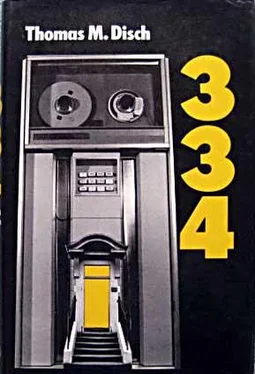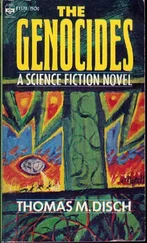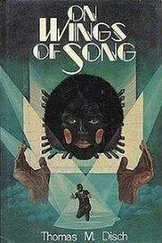All the things that happen and seem so important at the time, and yet you just forget them, one after another. He felt an elegant, controlled sadness, as though, were he to sit down now and work at it, he might write a fine, mature piece of philosophy.
“I’m going to sail away now. Okay?”
“Enjoy yourself,” Shrimp said.
He touched her ear with his lips, but it wasn’t, even in a brotherly sense, a kiss. A sign, rather, of the distance between them, like the signs on highways that tell you how far it is in miles to New York City.
The party was not by any means a form of insanity but Boz enjoyed himself in a quiet decorative way, sitting on a bench and looking at knees. Then Williken, the photographer from 334, came over and told Boz about Nuancism, Williken being a Nuancist from way back when, how it was overdue for a renaissance. he looked older than Boz remembered him, parched and fleshless and pathetically forty-three.
“Forty-three is the best age,” Williken said again, having at last disposed of the history of art to his satisfaction.
“Better than twenty-one?” Which was Boz’s age, of course.
Williken decided this was a joke and coughed. (Williken smoked tobacco.) Boz looked away and caught the fellow with the red beard eyeing him. A small gold earring twinkled in his left ear.
“Twice as good,” Williken said, “and then a bit.” Since this was a joke too, he coughed again.
He was (the red beard, the gold earring), next to Boz, the best-looking person there. Boz got up, with a pat to the old man’s frayed and folded hands.
“And how old are you?” he asked the red beard, the gold earring.
“Six foot two. Yourself?”
“I’m versatile, pretty much. Where do you live?”
“The East Seventies. Yourself?”
“I’ve been evacuated.” Boz struck a pose: Sebastian (Guido’s) spreading himself open, flowerlike, to receive the arrows of men’s admiration. Oh, Boz could charm the plaster off the walls! “Are you a friend of January’s?”
“A friend of a friend, but that friend didn’t show. Yourself?”
“The same thing, sort of.”
Danny (his name was Danny) grabbed a handful of the auburn hair.
“I like your knees,” Boz said.
“You don’t think they’re too bushy?”
“No, I like bushy knees.”
When they left January was in the bathroom. They shouted their good-byes through the paper panel. All the way home—going down the stairs, in the street, in the subway, in the elevator of Danny’s building—they kissed and touched and rubbed up against each other, but though this was exciting to Boz in a psychological way, it didn’t give him a hard-on.
Nothing gave Boz a hard-on.
While Danny, behind the screen, stirred the instant milk over the hot-coil, Boz, alone in all that double bed, watched the hamsters in their cage. The hamsters were screwing in the jumpy, jittery way that hamsters have, and the lady hamsters said, “Shirk, shirk, shirk.” All nature reproached Boz.
“Sweetener?” Danny asked, emerging with the cups.
“Thanks just the same. I shouldn’t be wasting your time like this.”
“Who’s to say the time’s been wasted? Maybe in another half-hour …” the moustache detached itself from the beard: a smile.
Boz smoothed his pubic hairs sadly, ruefully, wobbled the oblivious soft cock. “No, it’s out of commission tonight.”
“Maybe a bit of roughing up! I know guys who— ”
Boz shook his head. “It wouldn’t help.”
“Well, drink your Koffee. Sex isn’t that important, believe me. There are other things.”
The hamster said, “Shirk! Shirk, shirk.”
“I suppose not.”
“It isn’t,” Danny insisted. “Are you always impotent?” There, he had said the dreaded word.
“God, no!” (The horror of it!)
“So? One off-night is nothing to worry about. It happens to me all the time and I do it for a living. I’m a hygiene demonstrator.”
“You?”
“Why not? A Democrat by day and a Republican in my spare time. By the way, how are you registered?”
Boz shrugged. “What difference does it make if you don’t vote?”
“Stop feeling sorry for yourself.”
“I’m a Democrat actually, but before I got married I was Independent. That’s why, tonight, I never thought, when I came home with you, that—I mean, you’re damned good-looking, Danny.”
Danny blushed agreement. “Get off it. So tell me, what’s wrong with your marriage?”
“You wouldn’t want to hear about it,” Boz said, and then he went through the whole story of Boz and Milly: of how they had had a beautiful relationship, of how that relationship had then soured, of how he didn’t understand why.
“Have you seen a counselor?” Danny asked.
“What good would that do?”
Danny had manufactured a tear of real compassion and he lifted Boz’s chin to make certain he would notice. “You should. Your marriage still means a lot to you and if something’s gone wrong you should at least know what. I mean, it might just be something stupid, like getting your metabolic cycles synchronized.”
“You’re right, I guess.”
Danny bent over and squeezed Boz’s calf earnestly. “Of course I’m right. Tell you what, I know someone who’s supposed to be terrific. On Park Avenue. I’ll give you his number.” He kissed Boz quickly on the nose, just in time for the tear of his empathy to plop on Boz’s cheek.
Later, after one last determined effort, Danny, in nothing but his transparency, saw Boz down to the moat, which (also) was defunct.
When they had kissed good-bye and while they were still shaking hands, Boz asked, as though off-handedly, as though he had been thinking of anything else for the last half-hour: “By the way, you wouldn’t have worked at Erasmus Hall, would you?”
“No. Why? Did you go there? I wouldn’t have been teaching anywhere in your time.”
“No. I have a friend who works there. At Washington Irving?”
“I’m out in Bedford-Stuyvesant, actually.” The admission was not without its pennyworth of chagrin. “But what’s his name? Maybe we met at a union meeting, or something like that.”
“It’s a she—Milly Hanson.”
“Sorry, never heard of her. There are a lot of us, you know. This is a big city.” In every direction the pavement and the walls agreed.
Their hands unclasped. Their smiles faded, and they became invisible to each other, like boats that draw apart, moving across the water into heavy mists.
227 Park Avenue, where McGonagall’s office was, was a dowdy sixtyish affair that had been a bit player back in the glass-and-steel boom. But then came the ground-test tremors of ’96 and it had to be wrapped. Now it had the look, outside, of Milly’s last-year dirty-yellow Wooly© waistcoat. That, plus the fact that McGonagall was an old-fashioned-type Republican (a style that still mostly inspired distrust), made it hard for him to get even the official Guild minimum for his services. Not that it made much difference for them—after the first fifty dollars the Board of Education would pay the rest under its sanity-and-health clause.
The waiting room was simply done up with paper mattresses and a couple authenticated Saroyans to cheer up the noonday-white walls: an
Alice
and:
or
or
Fashionwise, Milly was doing an imitation of maiden modesty in her old PanAm uniform, a blue-gray gauzy jerkin over crisp business-like pajamas. Boz, meanwhile, was sporting creamy street shorts and a length of the same blue-gray gauze knotted round his throat. When he moved it fluttered after him like a shadow. Between them they were altogether tout ensemble, a picture. They didn’t talk. They waited in the room designed for that purpose.
Читать дальше












